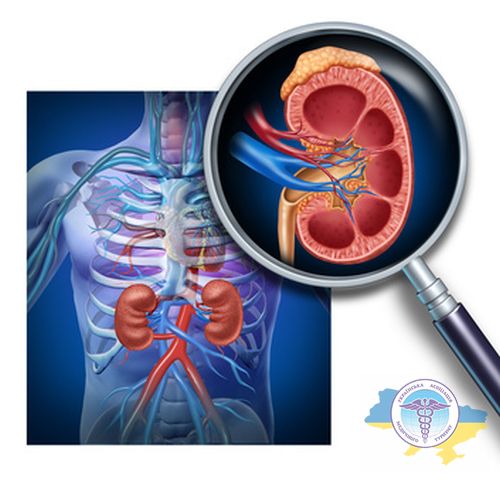Treatment of kidney cancer in German clinics

Kidney cancer is a malignant neoplasm that develops from the epithelium of the renal tubules. This type of tumor ranks 10th in terms of prevalence in the overall structure of cancer. The average age of patients is 60 years, while men are affected 2 times more often than women. In the vast majority of cases (98.5%), only one kidney is affected.
The disease is a late diagnosis, since in the early stages it is asymptomatic and is most often detected by chance during an ultrasound examination. This is why regular screening for early diagnosis is so important.
Kidney cancer treatment in Germany is considered one of the most effective in the world. German oncologists actively use innovative techniques, which allows them to achieve an overall 5-year survival rate among patients with this disease in Germany of 70%. For comparison, the European average is 60%.

Do you want to know how much the treatment costs?
Answer a few questions and get a preview of the cost of diagnosis and treatment!
Advantages of kidney cancer treatment in Germany
Germany is one of the world leaders in the treatment of cancer. Among the main advantages of kidney cancer treatment in Germany are:
- High-tech equipment in medical centers. Hospitals regularly invest in new diagnostic and treatment equipment. This allows for effective and safe treatment using innovative techniques.
- Highly qualified oncologists. 93% of German doctors have national and/or international certification in oncology. They constantly improve their skills and participate in clinical research.
- Use of organ-preserving operations. Thanks to the highly qualified German surgeons, organ-preserving kidney surgeries are widely practiced, which allows preserving their function after the intervention.
- Use of innovative medicines. In Germany, more than 4,600 clinical trials of new oncology drugs are currently being conducted, allowing patients to gain access to advanced therapies.
- Integrated approach. Treatment includes not only medical and surgical methods, but also psychological support, nutritional and rehabilitation recommendations to maintain quality of life.
Diagnostics of kidney oncology in German clinics

To accurately diagnose kidney oncology in Germany and develop an effective treatment regimen, German oncologists use a wide range of modern methods:
- Laboratory blood tests for tumor markers. Elevated levels of markers CEA, CA-125, CA-15-3, CA-19-9, β2-microglobulin, IL-6, IL-10, TGF-β in the blood may indicate the presence of a tumor process in the kidneys.
- Visualization methods. Ultrasound can detect space-occupying lesions as small as 3 mm, CT with intravenous contrast provides a detailed image of the kidneys, tumor and surrounding tissues, and MRI is used to clarify computed tomography data, especially in the presence of cysts.
- X-ray and radioisotope scanning of the chest and bones. These studies are performed to diagnose distant metastases in the lungs, ribs, and spine.
- Tumor biopsy under ultrasound guidance. Allows for subsequent histological examination to determine the type of tumor, and subsequently to select the optimal treatment tactics.
- PET-CT. A highly accurate method for diagnosing metastases and monitoring the effectiveness of therapy. Allows you to detect even small (3-5 mm) metastases throughout the body at an early stage. It is used to clarify the stage of the disease and assess the extent of the process.
- Genetic testing. It is carried out to identify mutations in genes that are associated with the development of different types of kidney cancer. Helps assess the risk of a hereditary disease.
- Angiography of the renal vessels. If a tumor is suspected, it is performed to assess changes in blood flow in the affected area. Reveals characteristic signs of a tumor, for example, defects in the filling of blood vessels.
- Retrograde pyelography. Contrast of the collecting system to identify filling defects caused by a tumor. Rarely used due to risk of dispersal of cancer cells.
Kidney cancer treatment methods in German clinics

German clinics use a wide range of modern methods to treat kidney cancer. The choice depends on the stage and location of the tumor, the presence or absence of metastases, and the general condition of the patient.
Surgical intervention
Kidney cancer is one of the tumors that is most often treated with surgery. In the early stages, with a localized tumor, organ-preserving kidney resection is performed. This allows you to remove the tumor while preserving the function of the organ.
For tumors larger than 7 cm, widespread and invasive forms, a radical nephrectomy is performed - complete removal of the affected kidney and surrounding tissue. In case of multiple metastases to other organs, cytoreductive surgery is performed, aimed at maximally reducing the volume of tumor tissue.
At the same time, German oncologist are trying to use gentle, minimally invasive methods (laparoscopic and robotic surgeries) where possible to solve the problem without affecting healthy organs.
Conservative techniques
Conservative (non-surgical) methods of treating kidney cancer in German clinics play a supporting but important role in complex therapy. Used here:
- Chemotherapy. Used for metastatic cancer to slow the progression and relieve symptoms of the disease. Systemic chemotherapy is based on targeted drugs that suppress key signaling pathways responsible for the growth and angiogenesis of malignant tumors.
- Hormonotherapy. Used for hormone-sensitive types of kidney cancer. Drugs are used that block the action of male (androgens) or female (estrogens) sex hormones, on which the growth of this type of tumor depends. Can be used either as monotherapy or in combination with other methods.
- Radiation therapy. Used for local irradiation of bone metastases. This allows you to reduce pain, prevent pathological fractures and other complications. High-precision irradiation techniques are used to ensure the most gentle effect on healthy tissue.
Minimally invasive methods
Minimally invasive surgeries avoid removal of the entire organ, ensure rapid recovery and minimal risk of complications. However, their use has limitations depending on the size and location of the tumor. Therefore, German doctors carefully select the optimal method for each patient:
- Radiofrequency ablation (RFA). A method in which a special electrode is inserted into the tumor through the skin and a radiofrequency current is applied to it, heating the tissue to 40-60°C. This leads to coagulative necrosis of the tumor. RFA is indicated for tumors up to 3-4 cm.
- Cryoablation. Freezing the tumor using probes through which liquid nitrogen or argon is passed at a temperature of -40-60°C. Causes cryonecrosis of cancer cells. Also only suitable for small tumors.
- Stereotactic radiosurgery. Irradiation of the tumor with high doses of isotopes under CT or MRI control. The beam is precisely focused on the tumor without affecting healthy tissue. Used for multiple metastases.
- Embolization. Injection of emboli - particles that clog the vessel - through a catheter into the artery feeding the tumor. This cuts off the blood supply to the tumor, causing it to shrink. Used for patients with high surgical risk.
- Laparoscopic surgery. A minimally invasive technique for removing a malignant tumor through small punctures in the abdominal wall using special instruments and a video camera. Allows you to save the organ with minor lesions.
- Robotic surgery (Da Vinci). To remove the affected areas, a surgical robot is used through pinpoint punctures. The method ensures the highest precision of manipulation and minimal trauma.
- HIFU therapy. Exposure to high-intensity ultrasound, which heats the affected tissues to 60-100°C, which leads to their coagulative necrosis. Monitored using an MRI machine.
- Nanoknife. A surgical technique for removing tumors using a special electrode that destroys cancer cells without damaging healthy tissue. Allows you to avoid removing the entire organ, limiting yourself to a dangerous area.
Medicine methods
- Oncolytic virotherapy. A method based on the introduction into the body of specially modified viruses that can selectively infect and destroy tumor cells. These viruses not only have a direct cytotoxic effect, but also stimulate the patient's immune system to effectively fight cancer. Virotherapy can be used in combination with antitumor vaccine therapy to increase its effectiveness.
- Immunotherapy with checkpoint inhibitors. Cancer cells express PD-L1/PD-L2 proteins on their surface, which suppress the activity of T lymphocytes through interaction with the PD-1 receptor on their surface. Special drugs block this interaction, restoring the ability of the immune system to recognize and eliminate tumor cells. This leads to regression of the tumor and metastases, stabilization of the process, and increased life expectancy.
- Targeted therapy. Treatment uses special medications aimed directly at molecular targets on the surface of malignant cells. The technique is characterized by high selectivity of action, minimal toxicity to healthy tissues, and the possibility of oral administration. In Germany, tyrosine kinase and angiogenesis inhibitors are used to treat kidney cancer. They suppress key signaling pathways for tumor growth and prevent the formation of new blood vessels, depriving the tumor of nutrition.
Cost of kidney cancer treatment in Germany
Prices for kidney cancer treatment in Germany depend on the stage of the disease and the individual treatment plan. For a preliminary cost estimate, you need to provide the clinic with an epicrisis and examination results (MRI, CT, etc.). Based on them, doctors will draw up a treatment plan and give an approximate estimate.
Below are prices for some medical procedures:
| Procedure | Cost, € |
|---|---|
| Diagnostics (consultations, tests, imaging) | from 3000 |
| Kidney resection | from 8000 |
| Open nephrectomy | from 11200 |
| Laparoscopic nephrectomy | from 12500 |
| Robot-assisted surgery (Da Vinci) | from 26500 |
| Chemotherapy | from 3000 |
| Targeted therapy | from 6000 |
| Immunotherapy | from 5000 |
| Radiation therapy | from 2500 |
| Rehabilitation | from 1580/day |
In any case, prices in German oncology centers are 15-25% lower than in US clinics with comparable quality of services.



